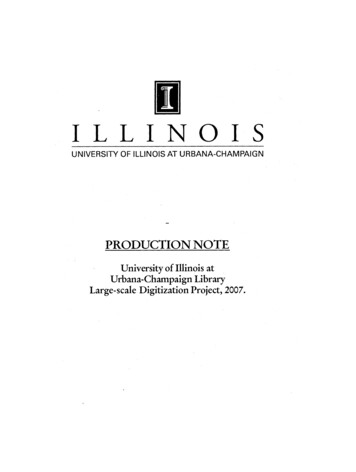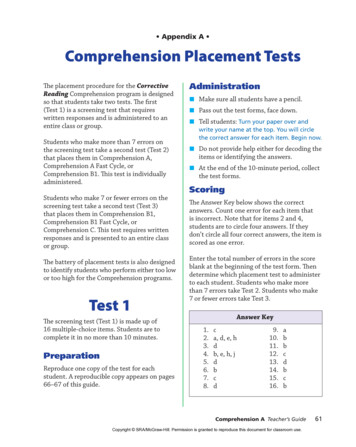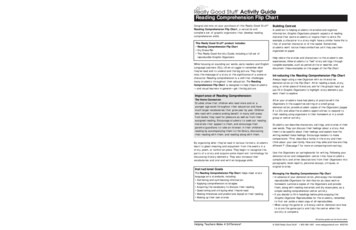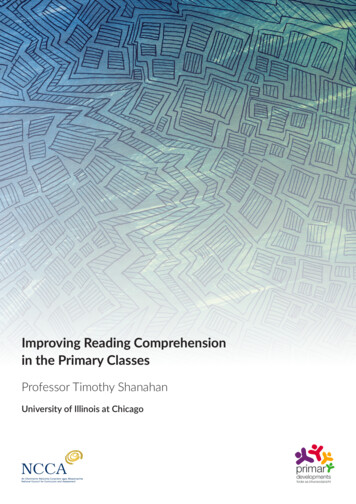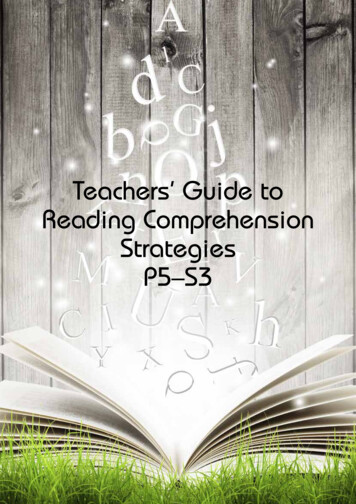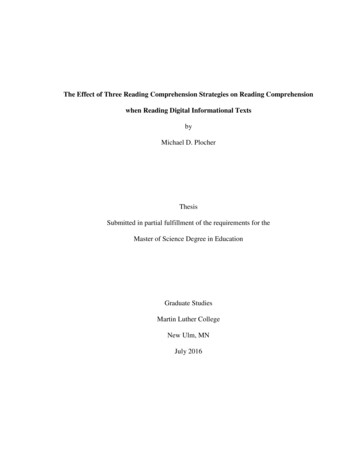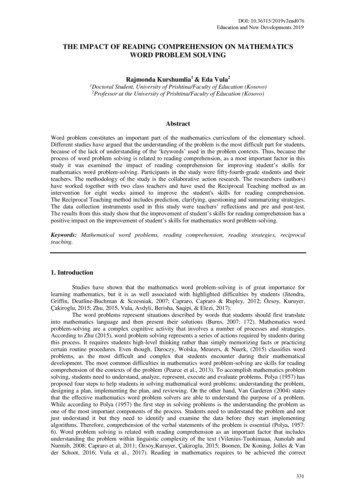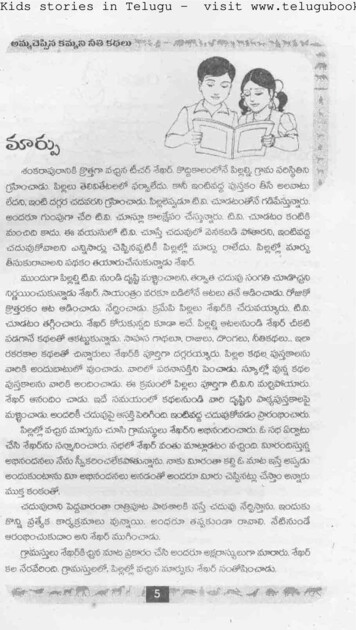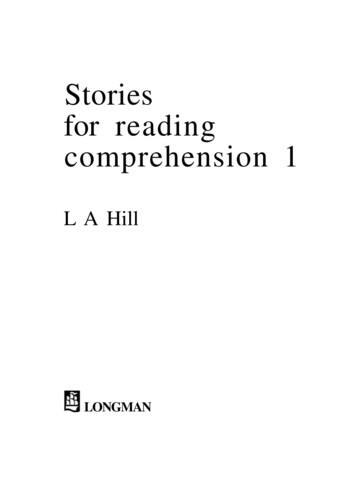
Transcription
Storiesfor readingcomprehension 1L A HillLONGMAN
INTRODUCTIONThis is the first of a series of three books which have beenwritten to replace my Comprehension and Precis Pieces, and FurtherComprehension and Precis Pieces written with R. D. S. Fielden.In this series of reading comprehension passages, the vocabulary and structures are carefully graded. The grading followsthat of the Longman Structural Readers. Book 1 of this seriescovers Stages 1 and 2 of those readers; Book 2 covers Stages 2and 3; and Book 3, Stages 4 and 5. Words outside the gradingare given at the end of each book.In this series, the comprehension questions contain no composition element; the students simply have to choose betweenalternatives which are supplied to them.The series also contains grammatical exercises. The instructions for these sometimes contain words which are outside thegrading. They are therefore more suitable for class than privateuse, unless the student has someone who can explain the difficult words. In a class, the teacher should explain such difficultwords to the students before asking them to do an exercise. Innearly all the grammatical exercises, the student has to choosebetween alternatives which he or she is given.L. A. Hill
Mr Jones's shop sold food. Mr Jones and a young man workedthere. The young man's name was George.A man came into the shop on Monday. He was a funny man.Mr Jones was in the office. It was behind the shop. The funnyman looked at George and said, "I want a small table, please."George said, "We don't sell tables in this shop. We sellfood."The man smiled and answered, "A small, brown table." Hetook a picture out of his bag and showed it to George. It wasa picture of a small, brown table.George put his mouth near the man's ear and said, "We donot have tables in this shop! Food! Not tables!"The man smiled and answered, "That's good. Thank you."Then he sat down on a chair and waited.George was not happy. He went into the office and spoketo Mr Jones. Then he and Mr Jones came out again.Mr Jones was angry. He looked at the man and said, "Whatdo you want?"The man smiled and answered, "I want a loaf of brownbread, please. Haven't you got any bread in your shop?"Mr Jones said, "Yes, we have." He looked at George, andthen he went and got a loaf of brown bread from a big box andgave it to the man.3
UNIT1Exercise 1Look at these questions. Find the right answers. Then write thequestions and the answers:1 Did Mr Jones work in George's shop?a) No, he didn't. b) Yes, he did.2 Who worked in Mr Jones's shop?a) A funny man did. b) George did.3 Did the shop sell tables, or food?a) It sold food. b) It sold tables.4 Did the funny man ask George for some food?a) No, he didn't. b) Yes, he did.5 Did the funny man ask George for a table?a) No, he didn't. b) Yes, he did.6 Did George show him a table?a) No, he didn't. b) Yes, he did.7 Whose office did George go into then?a) Mr Jones's. b) The funny man's.8 Did Mr Jones speak to the funny man?a) No, he didn't. b) Yes, he did.9 Was Mr Jones happy, or angry?a) He was angry. b) He was happy.10 Did the funny man ask Mr Jones for a table, or some food?a) A table. b) Some food.Exercise 2Write this story. Choose the right words each time:Mr Jones sold (food/tables and chairs) in his shop. His shop was(behind/in front of) his office. A (funny/young) man worked inthe shop too. (A/The) funny man came into the shop on Monday; He asked (George/Mr Jones) for a (chair/table). Then heshowed George a (picture of a table/table). George (did notsell/sold) the funny man a small, brown table. The funny man(smiled/was not happy). He sat down and (waited/was angry). Then(George/the funny man) brought Mr Jones out of the (office/shop).Mr Jones (smiled/was not happy). The funny man asked him fora (loaf of brown bread/small, brown table), and Mr Jones gave (hima big box/it to him).4
UNIT 1Exercise 3Use a/an when we can count a thing, and some when wecannot. Use an only when the next word begins with a,e, i, a, or u, or an h which is not pronounced (e.g. an hour).Look at these pictures. Put a, an, or some, in the empty places:1 George iseating . . .meal. He isputting . . .food in hismouth with. . . fork.2 NowGeorge isputting . . .butter on hisbread with . . .knife.6 There is . . .5 This is . . .glass. There is tea in this cup. . . milk in it. There is . .spoon in it.3 This is . . .4 This is . . .loaf of bread. egg. It is in . . .water.There is . . .cheese near it.8 This is , . .7 This is . . .cup too. There picture of . . .is . . . coffee in table.it.5
Gladys was at school in a small, quiet town in England. Shewas sixteen years old, and her father and mother were poor,and their house was very small.Maisie was Gladys's friend. She went to that school as well.Gladys said, "Maisie, I'm going to find a very rich man and I'mgoing to marry him. Then I'm going to have a beautiful houseand a large garden, and a lot of clothes, and a lot of money."Maisie smiled and said, "Where are you going to find a veryrich man, Gladys? There aren't any in our town."But Gladys was a very pretty girl. Her eyes were blue, andher hair was black and soft. She went to London, and then shewent to America. She found a tall, very rich man there, and shemarried him. She was twenty-two years old then.Then she and her husband went to England. They went toGladys's old house, and Maisie came there.Gladys said, "I've married a very rich man, Maisie, and I'vegot a beautiful house and a large garden and four gardeners.And I've bought a lot of clothes and I have money as well. Myhusband's got a plane too, and he flies it!"Maisie said, "A lot of people have got planes and fly them,Gladys.""In their house?" Gladys asked.6
UNIT 2Exercise 1Look at these questions. Find the right answers. Then write thequestions and the answers:12345678910Were Gladys's father and mother rich?a) No, they were not. b) Yes, they were.Did Gladys want to work in her small, quiet town?a) No, she did not. b) Yes, she did.Who did Gladys want to marry?a) A rich man. b) A tall man.Were there any very rich men in Gladys's town?a) No, there were not. b) Yes, there were a lot. c) Yes,there were some.Did Gladys marry in London, or in America?a) In London. b) In America.Was her husband a short man?a) No, he was tall. b) Yes, he was.Where did Maisie see Gladys again?a) In America. b) In London. c) In their small town.Whose house did they meet in?a) Gladys's old house. b) Maisie's house.Who flew the plane in this story?a) Gladys did. b) Gladys's husband did.Where did he or she fly it?a) In the garden. b) In the house.Exercise 2Write this story. Choose the right words each time:Gladys's school was in a (city/town/village), (and/but) Maisie'swas in a (city/town/village). Gladys lived in a (big/small) house.She had (black/blue) eyes, (and/but) she was (beautiful/not beautiful). She went to America (after/before) she went to London. Shemarried a man in (America/London). Then she went back to England (with/without) her husband. She met Maisie there.(Gladys/Maisie) had a very rich husband now. He had (aplane/two planes). (A lot of people/He) flew (it/them) in their house.7
UNIT 2Exercise 3We use the have/has done tense—the present perfect (e.g.has been, have opened) when the result of the action is stillthere; but we use the did tense — the past simple (e.g.saw, opened) when it is not, or when the time at which ithappened is given.Look at these examples:Gladys has opened thewindow. Look! It is open.Gladys opened the windowat 2 o'clock, but now she hasshut it. Look! It is shut.Put bought, has bought, came, has come, went, has gone, married,has married, sold or has sold, in the empty places:1 Gladys isn't here now. She. . . to America.2 This is America. Gladys. . . here in 1981, and nowshe . . . a tall, rich man.3 Gladys . . . to America in1981, but now she . . . backto England. She is saying,"This is Tom. We . . . inAmerica in 1982."4 Tom . . . this car from aman in January, but now he. . . it to a lady. It isn't hisnow.8
Alan Smith's father bought him a small shop, and Alan soldmilk, butter, cheese, eggs and other tilings in it. His shop was ina small town, and it was open on Tuesday, Wednesday, Thursday, Friday and Saturday, and on Sunday morning, but it wasshut on Sunday afternoon and on Monday.Alan went to some farms on Monday and bought their bestbutter and cheese and eggs from the farmers, but he boughthis milk in the town. A truck brought it to his shop in themorning. Alan and his wife worked in the shop, and they solda lot of their food, because it was good and clean.A fat woman came into the shop on Saturday. She boughtsome eggs and some butter, and then she said to Alan's wife,"Your eggs and your butter are dear today. Why are Saturdayand Sunday dearer than Tuesday, Wednesday, Thursday andFriday?"Alan's wife was unhappy. She looked at the fat woman, andthen she looked at Alan, but she did not give an answer.Then Alan smiled and said, "Our food is not dearer onSaturday and Sunday! It is cheaper on Tuesday, Wednesday,Thursday and Friday!"9
UNIT 3Exercise 1Look at these questions. Find the right answers. Then write thequestions and the answers:1Was Alan's shop open on Monday?a) No, it wasn't. b) Yes, it was.2Was Alan's shop shut on Saturday?a) No, it wasn't. b) Yes, it was.3Was Alan's shop open or shut on Sunday morning?a) It was open. b) It was shut.4Who sold Alan cheese?a) His father did. b) The farmers did.5Who brought Alan's butter to his shop?a) A man in a truck did. b) Alan did.6 Who brought milk to Alan's shop?a) A man in a truck did. b) Alan did.7Why did a lot of people buy food from Alan?a) Because he and his wife worked in the shop.b) Because the food was clean and good.8Who answered the fat woman's question?a) Alan did. b) Alan's wife did.9Was the answer an angry one, or a nice one?a) It was a nice one. b) It was an angry one.10Was the food in the shop dearer on Friday or on Saturday?a) It was dearer on Friday. b) It was dearer on Saturday.Exercise 2Write this story. Choose the right words each time:(Alan/Alan's father) bought a shop for (him/his father). He (did notsell any/sold) food in it, and it was open (every day/5.5 days) of theweek. Alan (bought/sold) tilings on Monday. The farmers(bought/sold) him food (and/but not) milk on their farms. (Hebrought them/They sold him) the best butter and cheese and eggs.10
UNIT 3The (food/milk) came to Alan's shop in a truck. Alan's wife (didnot work/worked) with him. (Alan and his wife were/Alan's food was)good and clean. A fat woman came into the shop. Alan's wifewas unhappy because she (asked a question/was fat). (Alan'swife/Alan) answered the question. The food in the shop was(cheaper/dearer) on Saturday and Sunday.Exercise 3Use any in questions (e.g. "Have you got any butter?")and in negative statements (e.g. "We haven't got any butter."), but use some when there is no question and nonegative (e.g. "We have got some butter.").Put some or any in the empty places:1 "Have you got . . . hardcheese?""No, we haven't got . . .hard cheese, but we havegot . . . . nice soft cheese."2 "I want . . . eggs. Haveyou got . . . brown ones?""Yes, we have got . . . nicebrown ones."3 "You haven't got . . .fruit.""No, we don't have . . . fruithere, but there are . . . orangesand apples in that shop."4 "Have you got . . . milk?""We haven't g o t . . . milknow, but we're going tohave , . . bottles thisafternoon."11
Mr and Mrs Brown had two daughters and two sons. Both thedaughters married, and then both the sons married too. SoonMr and Mrs Brown had a granddaughter, and then they hadtwo grandsons. They were very happy.Then one of their daughters had another baby, and she telephoned her mother, "Please come and help with your newgranddaughter." Mrs Brown went quickly, but Mr Brownstayed at home, because he was nearer his job there. But hesaid, "I'll come on Friday evening, and I'll stay till Mondaymorning."On Friday evening, after work, Mr Brown got into a train.He was very happy. "I'm going to see my new granddaughternow," he said.There were three empty places in the train. There was an oldman beside one empty place, and Mr Brown went to him andsaid nicely, "Are you a grandfather?""Yes," the man answered, "I have three granddaughters."Mr Brown went to the second empty place. There was a nicewoman beside that. Mr Brown said to her, "Are you agrandmother?"The woman answered, "Yes, I have two granddaughters andtwo grandsons."Mr Brown went to the third empty place. There was a manbeside that, and Mr Brown said to him, "And are you agrandfather?""No, I'm not," the man answered.Mr Brown smiled happily and said, "That's good." He satdown in the empty place and said to the man kindly, "NowI'll tell you about my granddaughters and grandsons."12
UNIT 4Exercise 1Look at these questions. Find the right answers. Then write thequestions and the answers:1 Did Mr and Mrs Brown have any children?a) Yes, they had four. b) Yes, they had two.2 Did their children marry?a) No, they did not. b) Yes, all of them did.two of them did.c) Yes,3 How many granddaughters did Mr and Mrs Brown have?a) One. b) Two.4 Did they have any grandsons?a) No, they did not. b) Yes, they had two.5 Who went and helped their daughter with her new baby?a) Mr Brown did. b) Mrs Brown did.6 Did Mr Brown go with his wife?a) No, he did not. b) Yes, he did.7 Why?a) Because he was ill.b) Because he had a job near his home.8 When did Mr Brown go to his daughter's house?a) On Friday evening. b) On Monday morning.9 How did he go?a) In a train. b) In his car.10 What did he do all the time in the train?a) He talked about his granddaughters and grandsons.b) He listened to stories about other people's granddaughters and grandsons.Exercise 2Write this story. Choose the right words each time:Mr and Mrs Brown (did not have any/had two) daughters,(and/but) they (did not have any/had two) sons. Mr and MrsBrown's children (did not have any/had some) children too. Mrs13
UNIT 4Brown (did not help/helped) one of her (daughters/sons) with(her/his) new baby. She went to her (daughter's/son's) house(with/without) her husband, because his job was (near/not near)the (daughter's/son's) house. Mr Brown (did not work/worked) onSaturday and Sunday, so he (did not go/went) to stay with his(daughter/son) then. He went in a train, and (did not sit/sat) beside another (grandfather/grandmother), because he only wantedto talk about (her/his) granddaughters and grandsons.Exercise 3To change an adjective into an adverb, we usually add ly(e.g. slow, slowly).Choose the right word each time:1 This is a (slow/slowly) train.It goes very (slow/slowly).2 Mr Brown is (happily/happy).He is smiling (happily/happy).3 The baby is (hungrily/hungry). 4 Mrs Brown and herIt is eating (hungrily/hungry).daughter must be(quiet/quietly). They aretalking (quiet/quietly).14
Joe was the son of a farmer. His father's farm was poor, andJoe worked on it for a long time, but then his father died, andJoe said, "I needn't stay here now. I'll sell this farm and buyone in a better place. Then I'll soon be rich."He bought a farm in the east of the country, but then Ms newneighbours said to him, "The weather's often very bad here.The wind's very strong, and it breaks windows and doors. Youmust build a room under the ground, and then you and yourfamily can go down there, and you'll be safe from the wind."So Joe built a room under the ground. It was a lot of work,because the ground was hard.But after that, the weather was good for a very long time.There was no wind, and Joe spoke angrily. He said, "Why didI listen to my neighbours? I didn't have to make that roomunder the ground. The wind never blows strongly here."But then one day there was a very strong wind, and Joe andhis family had to go down into their room under the ground.They were there for a long time. Then the wind stopped, andthey came up. All the windows and doors in their house werebroken.Joe was not angry about his work now. He smiled happilyand said, "Ah! I'm glad I built that room!"15
UNIT 5Exercise 1Look at these questions. Find the right answers. Then write thequestions and the answers:1What was Joe's father?a) He was a farmer. b) He was a teacher.2 Was his father rich?a) No, he was not. b) Yes, he was.3Why did Joe leave his father's farm?a) Because the wind was very strong there. b) Becausehe wanted a farm in a better place.4Why did he need a room under the ground?a) Because the doors and windows of his farm werebroken. b) Because there were very strong winds in thatplace.5Did the wind often blow strongly after that?a) No, it did not. b) Yes, it did.6 Was Joe happy about that?a) No, he was not. b) Yes, he was.7Why did he go down into the room under the ground oneday?a) Because the weather was very cold. b) Because therewas a very strong wind.8Who went with him?a) His family did. b) His new neighbours did.9What did the wind do?a) It broke the windows and doors of Joe's house. b) Itwent down into the room under the ground.1016Was Joe sad then?a) No, he was happy. b) Yes, he was.
UNIT 5Exercise 2Write this story. Choose the right words each time:Joe worked on his (father's/son's) farm. It was a (poor/rich) farm,because it was in a (bad/good) place. Then Joe bought(another/the) farm, and he (bought/made) a room under theground, because his (father/neighbours) said, "The (weather/wind)can (be/blow) very (good/strongly) here, and you will not be safein your house then." But the (weather was/wind did) not(blow/good) for a long time, and Joe was (angry/happy), becausehe (did not need/needed) his room under the ground, Then (thewind stopped/there was a very strong wind), and it broke the doorsand windows of Joe's (house/room under the ground). He was(happy/sad) after that.Exercise 3Must shows obligation (e.g. "The wind is very strong, soJoe and his family must go down into the room under theground.").If we want to show that there is no obligation, we canuse needn't (e.g. "Joe and his family needn't stay underthe ground now, because the wind has stopped.").For the past tense of must, we can use had to, and forthe past tense of needn't, we can use didn't need to.Put must, had to, needn't or didn't need to in the empty places:Joe said, "I want to be rich, so I , . . buy a farm in a betterplace." He wanted to be rich, so he . . . buy a farm in a betterplace. Then Joe said, "I've got a lot of cows, so I . . . buyothers." Joe had a lot of cows, so he . . . buy others.17
Lynn was five years old. She had a lot of little friends. Theywere older, and they were at school. These children told Lynnnice stories about school, so Lynn wanted to go there too.Then one day her mother said, "You can go to school now,Lynn," and Lynn was very happy.She was the youngest child in the school, and on the firstday, her mother stayed at school with her. But on the secondday, Lynn said to her, "You can go home now, Mummy."Lynn's mother was happy, but she was sad too, becauseLynn did not need her all the time now.Lynn was very happy at school, and she learnt a lot of thingsthere. Her mother always said, "What have you learnt today,Lynn?" and Lynn told her.One day, Lynn came back from school and said to hermother, "Miss Richards (she was Lynn's teacher) told us somenice stories today, Mummy. The best was about Ulysses. Hefought against the . . . the . . . er . . .""The Trojans," her mother said."Oh, yes, that's right," Lynn answered. "The Trojans. Andthen Ulysses went back in his ship with some other men. Hewent to see his wife . . . er . . . his wife . . .""Penelope," Lynn's mother said.Lynn stopped and looked at her mother. "Mummy," shesaid, "has someone told you this story already?"18
UNIT 6Exercise 1Look at these questions. Find the right answers. Then write thequestions and the answers:12345678910Did Lynn have any friends?a) No, she did not. b) Yes, she did.Did they go to school?a) No, they did not. b) Yes, they did.Why did Lynn want to go to school too?a) Because her friends told her nice stories about it,b) Because her friends were older.Who was the youngest in the school?a) Lynn's mother was. b) Lynn was.Did Lynn's mother stay with her?a) No, she didn't. b) Yes, she stayed with her for oneday. c) Yes, she stayed with her for two days.Was Lynn's mother happy or sad then?a) She was happy. b) She was happy and sad. c) Shewas sad.Who was Lynn's teacher?a) Lynn's Mummy. b) Miss Richards. c) Ulysses.Who fought against the Trojans?a) Lynn's Mummy. b) Miss Richards. c) Ulysses.Who was Ulysses' wife?a) Miss Richards. b) Penelope.Did Lynn's mother know the story about Ulysses?a) No, she did not, b) Yes, she did.Exercise 2Write this story. Choose the right words each time:Lynn's friends were (happy/not happy) at school, so Lynn (did notwant/wanted) to go there too. Then one day her mother(sent/took) her to school. Her mother (stayed there/went home) onthe first day, (and/but) she (stayed there/went home) on the secondday. She was (happy/sad) because Lynn (did not need/needed) herat school. Lynn (always/never) told her mother about herlessons. One day she told her (a story/some nice stories) aboutUlysses. She did not remember (all the/any) names. She forgot19
UNIT 6the name of (Penelope's/Ulysses') wife, so her mother (asked/told)her. The story of Ulysses is a very (new/old) one, so her mother(did not know/knew) it.Exercise 3Most nouns form their plural just by adding s (e.g. friend,friends). But if a noun ends in a consonant y, the ybecomes its in the plural (e.g. story, stories); and if anoun ends in fe the fe becomes ves (e.g. wife, wives).There are also some irregular plurals (e.g. child, children;man, men; woman, women).This becomes these in the plural (e.g. this girl, these girls);and that becomes those (e.g. that bay, those boys).Put the correct letter, or the correct ending, in the empty places:1 The two teacher. . . told all the child. . . some nicestor. . . .2 Ulysses and some other m. . .n went home to see theirwi. . . .Put that, those, this or these in the empty places:3 Do you want . , . book?4 Please bring me . . . books.5 I like . . . books.6 Why is , . . book on thefloor?20
Mr and Mrs Young's small house was in a village, but theirchildren's houses were in a town. Then Mr Young died. MrsYoung was eighty-five years old, and her children said to her,"Come and live in the town near us, Mother. Or come and livein one of our houses." But she said, "No, I'm not going to goto the town. I'm going to remain here."Her children were not happy. They said, "There are a lot ofburglars here now. Maybe one of them will come into herhouse and take her money and her nice things."One Sunday one of her daughters went to Mrs Young'shouse. She saw a key on the ground at the side of the frontdoor. "Mother!" she said, "You mustn't put your key there.That's the worst place. Burglars can see it and open the door!"Mrs Young smiled. "Try to open the door with the key," shesaid. Her daughter did this. The key made a lot of noise, butit did not open the door.Then Mrs Young said, "I hear the key in the lock, and thenI get one of my brother's old guns, go out of the back door andcreep up behind the burglars."21
UNIT 7Exercise 1Look at these questions. Find the right answers. Then write thequestions and the answers:1 Did Mr and Mrs Young's children live with them?a) No, they did not. b) Yes, they did.2 Did Mrs Young go and live with her children?a) No, she did not. b) Yes, she did.3 Why were her children not happy then?a) Because a burglar came into their mother's house.b) Because there were a lot of burglars in that place.4 What did one of Mrs Young's daughters see one day?a) A key. b) A lock.5 Where was it?a) In the lock. b) Near Mrs Young's door.6 Why is that not a good place for your key?a) Because people can see it and open the door with it.b) Because you will lose it.7 Where did Mrs Young's daughter put the key?a) In the house. b) In the lock.8 Did Mrs Young's daughter open the door with it?a) No, she did not. b) Yes, she did.9 Why didn't the door open?a) Because the key made a lot of noise. b) Because thekey was the wrong one.10 What did Mrs Young always do when she heard the keyin the lock?a) She crept up behind the burglars with a gun. b) Shemade a lot of noise.22
UNIT 7Exercise 2Write this story. Choose the right words each time:After her husband died, Mrs Young (stayed in the village/wentand lived in the town). Her children were not happy then, because she (did not live/lived) in one of their houses. Mrs Young(had some/lost her) money and nice tilings. (One of Mrs Young'sdaughters/Mrs Young) visited (one of her daughters/her) one Sunday. There was a key in the (garden/house) near the front door.(Mrs Young/Mrs Young's daughter) saw it and was (happy/nothappy), because (burglars can open doors with keys/she wanted toopen the door). But it was (a very old key/not the right key), and thedoor (opened/made a lot of noise). Mrs Young had her(father's/brother's) old gun, and she (crept up behind/hit) theburglars with it.Exercise 3To make a singular noun (e.g. cat), or a plural nounwhich does not end in s (e.g. men) possessive, put 's afterit (e.g. cat becomes cat's, and men becomes men's); butput ' after a plural noun which does end in s (e.g. teachersbecomes teachers').Put 's, ' or s' in the empty places:1 Mrs Young. house was in a village.2 Her children. houses were in a town.3 She had two sons and two daughters. Her son. nameswere Fred and Bill, and her daughter. names were Janeand Ann.23
Billy is twelve years old, and his sister is fifteen. It wasSaturday yesterday, and Billy's father gave him fifty pence.There is a big tree in Billy's garden, and he climbed it and satin it. He likes that place in the tree very much.Then Billy looked at his fifty pence and said, "I'm going togo to the market tomorrow on my bicycle, and I'm going to buysome seeds with this money. Then I'm going to plant themunder this tree. I'm going to have a lot of flowers and fruit andplants, and I'm going to sell them."A lot of people are going to come to my garden every day,and they're going to buy my nice flowers and fruit and plants,and in the end I'm really going to have a lot of money. ThenI'm going to grow up and go to university, and I'm going tobe a doctor."Then my sister will come to me and say, 'Doctor, Doctor,I've broken my left arm! Please help me!' And I'm going to sether arm."The sky was blue, the weather was hot, and Billy was tiredafter that, so he went to sleep in the tree. But then he fell outof the tree and broke his left arm. His mother took him to thedoctor, and she set it.24
UNIT 8Exercise 1Look at these questions. Find the right answers. Then write thequestions and the answers:1 Who is older, Billy or his sister?a) Billy is. b) His sister is.2 Where did Billy sit yesterday?a) In a tree. b) In his house.3 Where did Billy want to go on Sunday?a) To a big tree. b) To the market.4 Why did he want to go there? a) Because he wanted a bicycle. b) Because he wantedsome seeds.5 What did he want to do with the seeds?a) He wanted to plant them. b) He wanted to sell them.6 Why did he want to grow flowers and fruit and plants?a) Because he wanted money. b) Because he wanted tobuy them.7 What did he want to be?a) A teacher at a university. b) A doctor.8 What did he want to do to his sister then?a) He wanted to come to her. b) He wanted to set herarm.9 Why did Billy fall out of the tree?a) Because he was tired. b) Because he went to sleep.c) Because the weather was hot.10 Who set his arm?a) His mother did. b) His sister did. c) The doctor did.25
UNIT 8Exercise 2Write this story. Choose the right words each time:Billy (sat under/went up) a big tree yesterday, because (he lavedit/his father gave it to him). There was a market on (Saturday/Sunday) and Billy wanted to go there. He wanted to (sell hisbicycle/take his fifty pence) there and buy some seeds with the(bicycle/money). Then he wanted to plant (a tree/the seeds). Hewanted to (buy/sell) nice flowers and fruit and plants, and to(get/give) a lot of money for them. Then he wanted to (go to/visit)the university and to (be/see) a doctor. He wanted to (be/visit)his sister's doctor, and to (hold/set) her arm. But (Billy/the tree)fell, and (he/it) broke his arm, and (his mother/his sister/the doctor)set it.Exercise 3Use he or him when you are writing about a man or a boy,she/her when you are writing about a woman or a girl, andthey/them when you are writing about more than one person. Use I/me when the person is speaking about himself/herself, and you when the person is addressingsomeone else. Use we/us when the person is speakingabout himself or herself plus one or more other people.Use he/she/they/I/we when the word is the subject, andhim/her/them/me/us when it is the object. You can be usedboth for the subject and for the object.Put I, you, she, her, he, him, we, us, they or them in the emptyplaces:Ruth is Billy's sister. . . . is fifteen years old. Billy loves . . .very much. . . . said to . . ., "Do you want these flowers,Ruth?" and Ruth said to . . ., "Thank . . ., Billy. . . . don'twant flowers now, but . . . can give me some tomorrow. . . .am going to go out with my friend Lily then, and . . . are goingto visit some friends. . . . have invited . . . to tea. Lily and. . . can give . . . the flowers then."26
In the last fifty years, a lot of people have left Europe and havegone to live in Australia. One of them was a Hungarian man.He lived in Australia for a long time, and after that, he had alot of good friends. He always said to them, "Australia's beautiful, but Hungary's beautiful too."Then one year he said, "I'm going to go back to Hungarynow to visit my old home." All of his new friends said to him,"We want to go with you, because Hungary's a beautiful country, and we want to see it too."The Hungarian Australian took all his friends from Sydneyto Rome in a big plane, and then they we
written to replace my Comprehension and Precis Pieces, and Further Comprehension and Precis Pieces written with R. D. S. Fielden. In this series of reading comprehension passages, the vocabu lary and structures are carefully graded. The grading follows that
